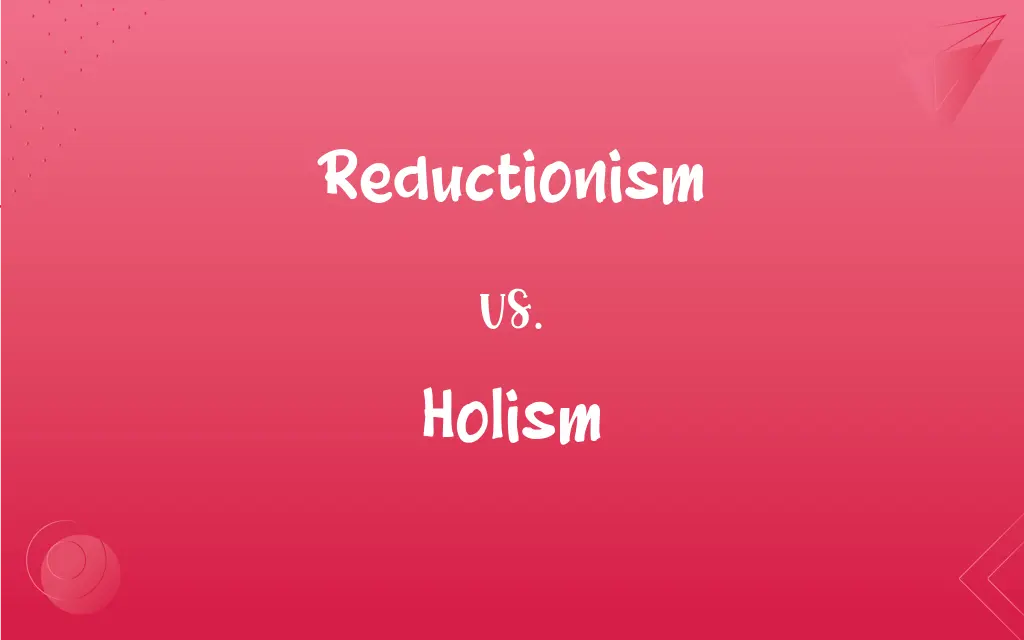Reductionism vs. Holism: What's the Difference?
By Aimie Carlson || Updated on May 23, 2024
Reductionism breaks down complex systems into simpler parts for understanding, while holism considers systems as whole entities, emphasizing the interconnections and interactions within them.

Key Differences
Reductionism is an approach that breaks down complex phenomena into their simplest components. This method is often used in science and philosophy to understand and explain systems by examining their individual parts. Holism, on the other hand, emphasizes understanding systems as complete, integrated wholes. It focuses on the interactions and relationships between parts, arguing that the whole is greater than the sum of its parts.
Reductionism is particularly useful for detailed analysis and understanding the specific functions of parts within a system, whereas holism is valuable for grasping the broader context and interactions within a system. Both approaches have their strengths and limitations, depending on the context of their application.
In medical science, reductionism might focus on treating symptoms or specific organs, whereas holism would consider the overall health and well-being of the patient, including lifestyle and emotional factors. Similarly, in psychology, reductionism might study neural mechanisms, while holism would examine behavioral patterns and social influences.
Reductionism can lead to detailed, precise knowledge but might overlook the complexity of interactions, whereas holism can provide a comprehensive understanding but might lack detailed insights into specific components. Both perspectives are often necessary to fully understand complex systems.
Comparison Chart
Definition
Breaks down systems into simpler parts
Considers systems as integrated wholes
ADVERTISEMENT
Focus
Individual components
Interconnections and interactions
Application
Detailed analysis in science and philosophy
Comprehensive understanding in various fields
Example in Biology
Studying cells or molecules
Studying ecosystems
Strength
Detailed and precise knowledge
Broad, comprehensive understanding
Reductionism and Holism Definitions
Reductionism
Method in science and philosophy.
Reductionism helps in understanding the basic functions of an organism.
ADVERTISEMENT
Holism
Integrated system view.
Holism in sociology studies societal structures and their influences.
Reductionism
Focus on simpler parts.
In medicine, reductionism might treat symptoms rather than the whole patient.
Holism
Broad understanding.
Holism in education promotes learning through interconnected subjects.
Reductionism
Detailed component analysis.
Reductionism in psychology studies specific brain functions.
Holism
Focus on relationships.
Holism in psychology looks at the influence of social dynamics on behavior.
Reductionism
Approach breaking down systems.
Reductionism in physics often involves analyzing atomic particles.
Holism
Approach considering whole systems.
Holism in ecology examines the interactions within an ecosystem.
Reductionism
An attempt or tendency to explain a complex set of facts, entities, phenomena, or structures by another, simpler set
"Science requires some degree of reductionism, some picking apart and focusing on one or two variables at a time" (Natalie Angier).
Holism
Emphasis on interconnections.
Holism in health care considers the patient's lifestyle and mental state.
Reductionism
An approach to studying complex systems or ideas by reducing them to a set of simpler components.
Holism
The theory that living matter or reality is made up of organic or unified wholes that are greater than the simple sum of their parts.
Reductionism
(philosophy) A philosophical position which holds that a complex system is nothing but the sum of its parts, and that an account of it can be reduced to accounts of individual constituents. In a reductionist framework, the phenomena that can be explained completely in terms of relations between other more fundamental phenomena, are called "epiphenomena".
Holism
A holistic investigation or system of treatment.
Reductionism
A theory that all complex systems can be completely understood in terms of their components
Holism
A theory or belief that the whole is greater than the sum of the parts.
Reductionism
The analysis of complex things into simpler constituents
Holism
A practice based on such a theory or belief.
Reductionism
Individual element focus.
Reductionism can lead to advancements in technology by isolating key components.
Holism
The theory that the parts of any whole cannot exist and cannot be understood except in their relation to the whole;
Holism holds that the whole is greater than the sum of its parts
Holistic theory has been applied to ecology and language and mental states
FAQs
Can reductionism and holism be combined?
Yes, combining both approaches can provide a more comprehensive understanding of complex systems.
What does holism emphasize?
Holism emphasizes understanding systems as complete, integrated wholes.
How does holism approach psychology?
E.g., Holism in psychology examines behavioral patterns and social influences.
How is holism applied in medicine?
E.g., Holism in medicine considers the overall health and well-being of the patient.
What is reductionism?
Reductionism is an approach that breaks down complex systems into simpler parts for understanding.
What are the limitations of holism?
Holism might lack detailed insights into specific components of a system.
How is reductionism used in science?
E.g., Reductionism is used in biology to study cells or molecules to understand organisms.
What are the limitations of reductionism?
Reductionism might overlook the complexity of interactions within a system.
What are the strengths of holism?
Holism offers a broad, comprehensive understanding of systems and their interactions.
How does reductionism approach psychology?
E.g., Reductionism in psychology might study neural mechanisms or specific brain functions.
What are the strengths of reductionism?
Reductionism provides detailed, precise knowledge of individual components.
Why is holism important in education?
E.g., Holism promotes interconnected learning across various subjects.
What is an example of reductionism in physics?
E.g., Reductionism in physics analyzes atomic particles to understand matter.
What is an example of holism in ecology?
E.g., Holism in ecology examines the interactions within an ecosystem.
Why is reductionism important in technology?
E.g., Reductionism helps isolate key components leading to technological advancements.
What is a holistic approach in sociology?
E.g., A holistic approach in sociology examines societal structures and their influences.
Can reductionism explain complex systems entirely?
No, reductionism alone might not fully explain the complexity and interactions within systems.
How does reductionism treat medical conditions?
E.g., Reductionism might focus on treating specific symptoms or organs.
How does holism treat medical conditions?
E.g., Holism considers the patient's overall lifestyle and emotional factors.
What is a reductionist approach in sociology?
E.g., A reductionist approach in sociology might study individual behavior in isolation.
About Author
Written by
Aimie CarlsonAimie Carlson, holding a master's degree in English literature, is a fervent English language enthusiast. She lends her writing talents to Difference Wiki, a prominent website that specializes in comparisons, offering readers insightful analyses that both captivate and inform.
































































